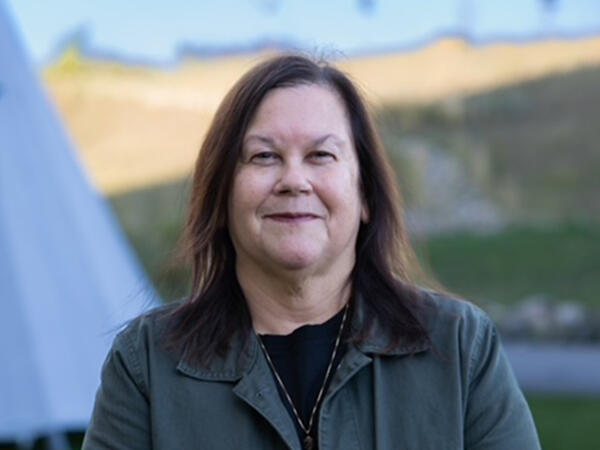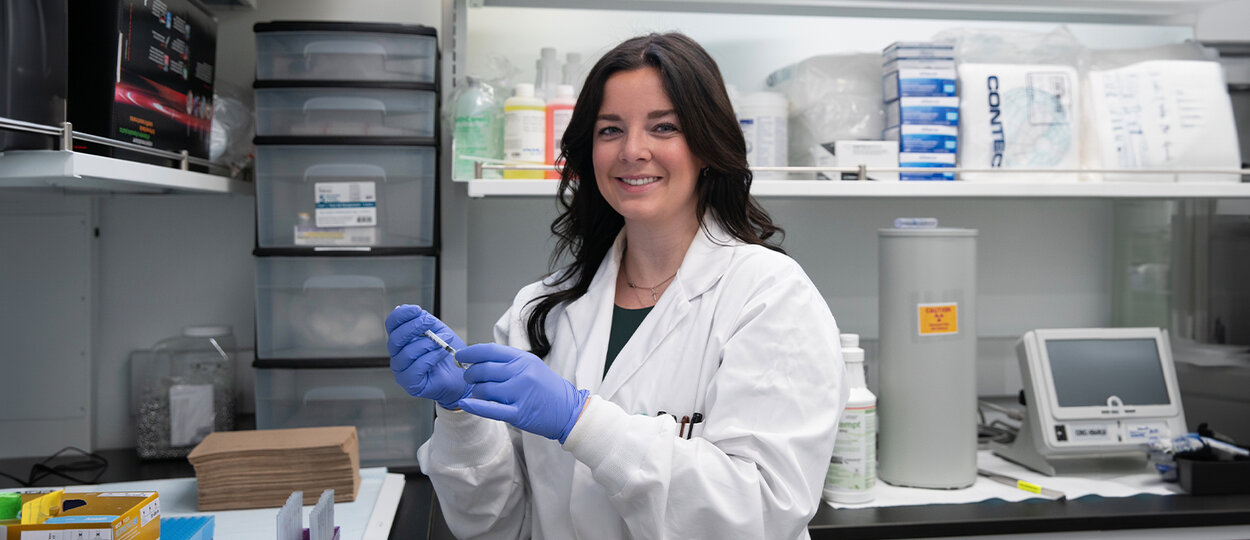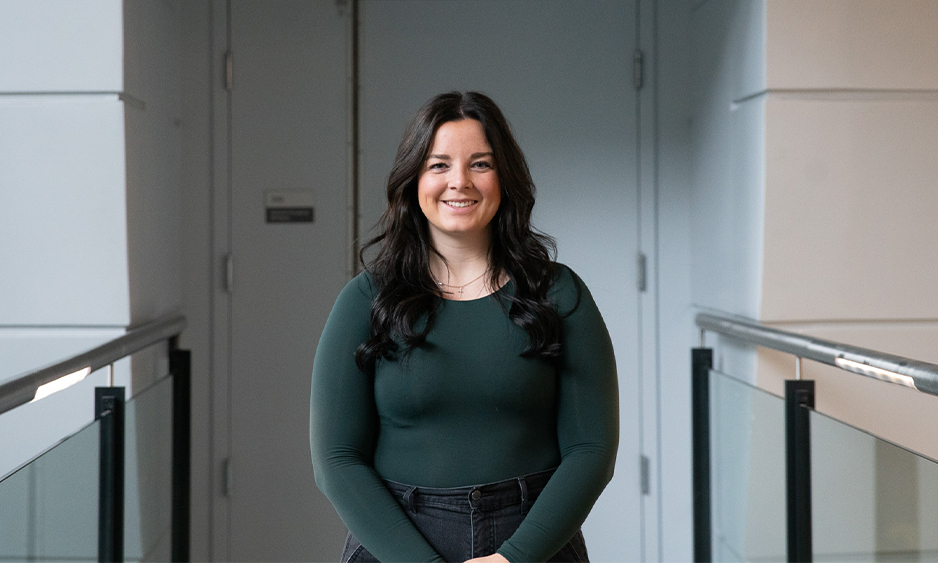Stephanie Borlase – like many students in pharmaceutical sciences – started her graduate studies to improve treatments for patients. And she will have the unique opportunity to see a radiopharmaceutical that she helped to develop being tested in a clinical trial.
“This project provides me with the opportunity to learn different aspects of research and be on the forefront of patient treatments,” says Borlase, a PhD student at the Leslie Dan Faculty of Pharmacy. “It is such an amazing opportunity to be able to see what is happening in the hospital with current patients and clinical trials and know that my research is actually getting to patients.”
Borlase completed her undergraduate and master’s degrees at the University of Manitoba, where she studied a pediatric brain cancer called medulloblastoma. She was particularly interested in a PhD where she could conduct research with the potential to be translated into patients as new therapies for hard-to-treat cancers.
“It is such an amazing opportunity to be able to see what is happening in the hospital with current patients and clinical trials and know that my research is actually getting to patients.”
In 2022, she started her PhD at the Leslie Dan Faculty of Pharmacy with Raymond Reilly, professor in the Leslie Dan Faculty of Pharmacy and director of the Centre for Pharmaceutical Oncology (CPO), whose research focuses on developing radiopharmaceuticals to image and treat cancer.
By attaching radioactive isotopes to highly targeted agents, the radiopharmaceuticals allow physicians to image tumours through scans (for example, positron emission tomography, or PET scans) and deliver therapeutic doses of radiation directly to the tumour.
With the lab’s recently built Good Manufacturing Practices (GMP) facility, which prepares radiolabelled pharmaceuticals for clinical trials, Reilly’s team and the CPO have partnered with oncologists and imaging specialists at Sunnybrook Health Sciences Centre to provide radiopharmaceuticals for clinical trials to image drug delivery to various forms of cancer.
In a recent clinical trial, clinicians and scientists at Sunnybrook studied a revolutionary technique that uses focused ultrasound to locally disrupt the protective blood-brain barrier to improve the delivery of treatments for brain metastases in patients with breast cancer. Reilly’s team provided a radiopharmaceutical that tracked the delivery of the breast cancer drug trastuzumab (Herceptin®) to brain metastases in patients, providing the first evidence that this technique indeed improved uptake of the drug. Now, Borlase’s research is contributing to a subsequent trial.
Borlase will work closely with clinicians on trial to test radiopharmaceutical
In her PhD project, Borlase has been formulating and testing a radiopharmaceutical that aims to track the delivery of the immunotherapy drug pembrolizumab (Keytruda®) to brain metastases of lung cancer using a PET scan. Immunotherapy has shown potential as a treatment for lung cancer, but it is not able to cross the blood-brain barrier.
Her goal is to pair pembrolizumab with a radioactive isotope that can be imaged by PET. This radiopharmaceutical could allow physicians to determine whether the therapy enters the brain and concentrates better in tumours after applying focused ultrasound.
During the first two years of her PhD, Borlase worked in the GMP facility to prepare the new radiopharmaceutical for clinical trials, optimizing and formulating the drug in a quality suitable for use in humans and testing it in preclinical models to ensure it worked as expected. Now she will be supplying the clinical team at Sunnybrook Health Sciences Centre with the radiopharmaceutical for the clinical trial.
The trial, which is planned for the new year, will test whether focused ultrasound can disrupt the blood-brain barrier to increase the uptake of immunotherapy into brain metastases to improve the treatment of patients with lung cancer. The new radiopharmaceutical will be used to track drug delivery to brain metastases with a PET scan.
Borlase’s supervisor, Professor Raymond Reilly, says that this is an exceptional experience for a graduate student.
“One of the greatest impacts and rewards of pharmaceutical sciences research is to see your work advanced to a clinical trial to make a difference in patient outcomes, which Stephanie has this wonderful opportunity to do,” says Reilly. “Not only is she developing the radiopharmaceutical, but she will be working closely with the oncologists and imaging specialists to design and conduct the trial and will get first-hand experience in seeing the results of her PhD research in the PET images of the patients in the trial.”
Borlase recently received a three-year, $141,000 Research Training Award from the Canadian Cancer Society in partnership with the Brain Canada Foundation – one of only 15 PhD students from across Canada to receive the award. The prestigious award will not only support her research, but also enable networking with other cancer research trainees and patient groups, and provide training and support to help launch a successful career in translational cancer research.
“It's such a rare opportunity for PhD students to be able to work with clinician-scientists or oncologists and actually see their research translate into a clinical setting, so the fact that I am able to do this is incredible.”
Borlase says that she hopes the trial will lead to better therapies for a form of cancer that is often difficult to treat.
“I always hope that researchers can develop new treatments for cancer because it is such a terrible disease that is never going to disappear. Even if we cannot completely cure the brain metastases, we can work to prolong survival to give these individuals more time with their families and friends,” says Borlase.
“It's such a rare opportunity for PhD students to be able to work with clinician-scientists or oncologists and actually see their research translate into a clinical setting, so the fact that I am able to do this is incredible.”
Stephanie Borlase is supported through a Research Training Award from the Canadian Cancer Society in partnership with Brain Canada. Funding from the Cancer Research Society supported development of the radiopharmaceutical.
More News
Image

Research team aims to co-design diabetes and dementia support programs that meet community needs
Network for Health Populations funding will support collaborative project to improve health outcomes for immigrant communities in Mississauga.
Read More
Image

Pharmaceutical industry resident finds growth in new challenges
Pharmaceutical Industry Residency Program Award recipient AnnaMaria Passas gained new skills through residency and research project to improve marketability in industry.
Read More
Image

Pharmacy alum sees change in acceptance of Indigenous cultures in health care
During Deborah Emery’s 40-year pharmacy career, she provided care in Sioux Lookout, Thunder Bay and Manitoulin Island.
Read More

